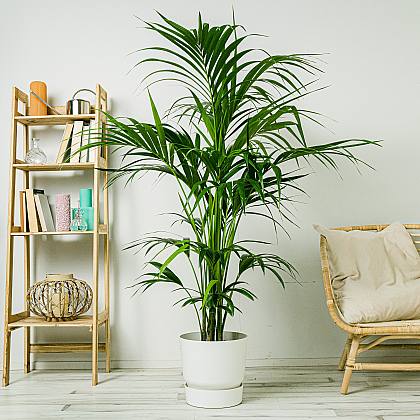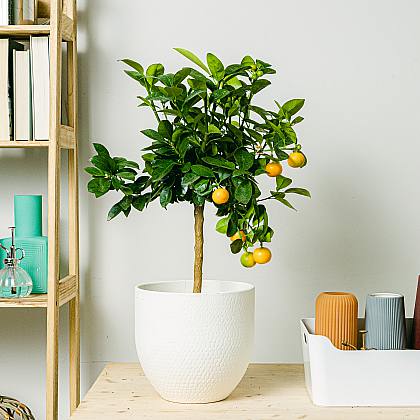Choose the perfect fruit tree for your terrace or interior: lemon and olive trees
If you're looking for a way to add beauty and flavor to your deck or interior, fruit trees are the perfect choice. In this article, we will focus on two trees in particular: the lemon tree and the olive tree
If you're looking for a way to add beauty and flavor to your deck or interior, fruit trees are the perfect choice. In this article, we will focus on two trees in particular: the lemon tree and the olive tree. We'll find out why choosing a fruit tree can be a great choice, and explore the basic characteristics and care of each of them. In addition, we will learn how to take advantage of the fruits of the lemon and olive tree, and how to grow an olive tree in a pot. Beautify your spaces with the freshness and versatility of these fruit trees.
Why Choose a Fruit Tree?
Choosing a fruit tree for your terrace or interior can be an excellent idea for several reasons. First of all, it will allow you to enjoy fresh and tasty fruits right from your home. In addition, fruit trees are a healthier option than processed sweets and other high-calorie foods. They can also provide shade and coolness to your home during the summer months, which can reduce the need for air conditioning.
Another advantage of having a fruit tree is its natural beauty. Lemon and olive trees, for example, have lush foliage and fragrant flowers that can beautify any space. In addition, fruit trees can improve air quality by filtering pollutants and producing oxygen.
Growing a fruit tree can also be a relaxing and rewarding activity. As you care for and watch it grow, you can learn more about nature and gain gardening skills. In addition, by sharing fruits with friends and family, you can create a cozy and pleasant atmosphere in your home.
In short, choosing a fruit tree for your terrace or interior can offer you multiple benefits: from the enjoyment of fresh fruits to the improvement of air quality and the creation of a welcoming atmosphere. So, if you have the right space and are willing to put time and effort into caring for it, a fruit tree could be the perfect choice for you!
The lemon tree: beauty and flavour in a single tree
The lemon tree: beauty and flavour in a single tree
The lemon tree is an ideal choice for those looking to combine the beauty of a fruit tree with the satisfaction of enjoying delicious lemons at home. In addition to its aesthetic appeal, with its glossy green leaves and fragrant white flowers, this tree stands out for its versatility and ease of cultivation.
One of the main advantages of the lemon tree is its ability to adapt to both outdoor and indoor spaces. It can be grown in pots and placed on decks, patios, or even indoors, as long as it receives enough sunlight. This makes it a great choice for those who live in apartments or houses with tight spaces.
In addition to its ornamental value, the lemon tree offers the benefit of having fresh, flavorful lemons on hand. These citrus fruits are known for their high content of vitamin C and other essential nutrients for our health. From making refreshing lemonades to dressing salads and flavoring your favorite dishes, lemon tree lemons can be used in many ways in the kitchen.
Growing a lemon tree requires some basic care, such as providing it with well-drained soil, watering it regularly but not excessively, and making sure it gets enough sunlight. However, in exchange for this care, the lemon tree will reward its owners with its beautiful presence and the possibility of enjoying delicious fresh lemons straight from the tree.
Basic care for the lemon tree
The lemon tree is a very popular fruit tree due to its beauty and flavor. However, to keep it healthy and productive, it's important to follow some basic care. First of all, the lemon tree needs a suitable location with enough direct sunlight and protection from strong winds. In addition, the soil should be well-drained and rich in nutrients, so it is recommended to add organic compost regularly. Watering is also essential for the lemon tree, especially during the warmer months of the year. It is recommended to water the tree regularly, preventing the soil from drying out completely between waterings. It is also important to control the amount of water given to the lemon tree, as too much water can lead to root rot. In addition, it is necessary to prune the lemon tree regularly to maintain its shape and stimulate fruit production. Pruning should be done in spring or summer, removing dead or diseased branches and those that are growing in unwanted directions. Finally, it is important to control pests and diseases that can affect the lemon tree, such as whitefly or rust. In short, if these basic care are followed, the lemon tree can be a beautiful and productive fruit tree on any terrace or garden.
The olive tree: a versatile and resistant tree
The olive tree is a fruit tree that stands out for its versatility and resistance. Native to the Mediterranean region, the olive tree has been cultivated for centuries for its valuable fruits, olives, as well as for its wood and ornamental beauty. One of the most prominent characteristics of the olive tree is its ability to adapt to different climatic conditions and soil types, making it an ideal choice for growing in various regions. In addition, this tree is able to withstand long periods of drought and high temperatures, making it a perfect choice for those who live in areas with arid or hot climates. Likewise, the olive tree is resistant to pests and diseases common in other fruit trees, which makes it easier to care for and maintain. Its evergreen foliage and elegant shape add a touch of beauty to any space, whether in gardens, terraces or indoors. In short, the olive tree is a versatile and resistant fruit tree that can adapt to different climatic conditions and soil types, offering not only its prized fruits but also a charming aesthetic to the spaces where it is grown.
Tips for Growing an Olive Tree in a Pot
Growing an olive tree in a pot is a great option for those who don't have enough space to plant a tree in the ground or for those who want to have a tree on their deck or balcony. To begin with, you should choose a pot large enough so that the roots of the olive tree can grow properly. A pot of at least 50 cm in diameter and depth is recommended. In addition, it is important to use good quality, well-drained soil, mixed with sand and small stones to ensure good drainage. The olive tree needs a lot of sunlight, so the pot should be placed in a sunny location protected from the wind. It is also important to water the olive tree regularly, but without overwatering, as overwatering can damage the roots. It is recommended to water the olive tree every two weeks in winter and every week in summer. Finally, it is important to fertilize the olive tree with organic fertilizer once a month during the spring and summer. With this basic care, you can grow a beautiful potted olive tree and enjoy its fruits and beauty for many years to come.
How to take advantage of the fruits of the lemon and olive tree
Both the lemon tree and the olive tree are fruit trees that, in addition to being a decorative option for our spaces, provide us with a large number of benefits. The fruits of both trees have multiple culinary and medicinal uses, so taking advantage of them is an excellent idea. In the case of the lemon tree, its fruits are rich in vitamin C and citric acid, making them ideal for preparing refreshing drinks, desserts and savoury dishes. In addition, its peel is very aromatic and is used in the production of essential oils, perfumes and cleaning products. To get the most out of the fruits of the lemon tree, it is important to pick them when they are ripe and yellow, and keep them in a cool, dry place. On the other hand, the olive tree provides us with olives, which are rich in healthy fats and antioxidants. These can be consumed directly or used to make olive oil, one of the fundamental ingredients of the Mediterranean diet. To grow an olive tree in a pot and obtain its fruits, it is important to choose a suitable variety for this type of cultivation and provide it with the necessary care, such as watering frequently and fertilizing with organic fertilizer. In conclusion, taking advantage of the fruits of the lemon and olive tree is an excellent way to obtain benefits for our health and enjoy their flavor and aroma in the kitchen.
Beautify your spaces with the freshness of fruit trees
Fruit trees are not only a source of delicious fruit, but they can also be a beautiful and refreshing addition to any indoor or outdoor space. The freshness and greenery provided by fruit trees can transform a drab area into an oasis of tranquility and beauty. In addition, the sight and scent of fruit trees can improve mood and reduce stress. While many fruit trees are large and require a lot of space to grow, there are smaller options that can be grown in pots, making them ideal for decks, patios, and balconies. Lemon and olive trees are two popular choices due to their ability to grow in pots and their resistance to harsh weather conditions. In addition, lemon trees have bright green leaves and fragrant flowers, while olive trees have a rustic and elegant look. In short, fruit trees are not only a healthy food source, but also a natural way to beautify your spaces with their freshness, aroma, and beauty.
Fruit trees, such as lemon and olive trees, are not only a beautiful addition to your terrace or interior, but they also give you the opportunity to enjoy their tasty fruits. In addition, their basic care is simple and they easily adapt to pots, making them ideal options for any space. Both the lemon tree and the olive tree are versatile and resistant trees, capable of beautifying your spaces with their freshness and vitality. Taking advantage of the fruits they offer will not only allow you to enjoy their unique flavor, but also add a special touch to your meals and decorations. Do you dare to grow one of these fruit trees on your terrace or indoors? Discover the beauty and benefits they can bring to your home


